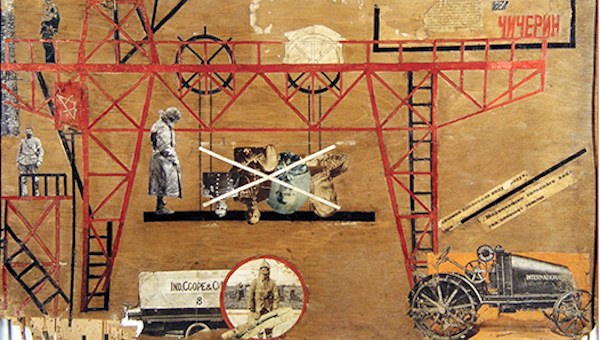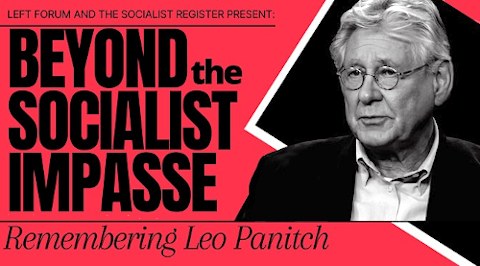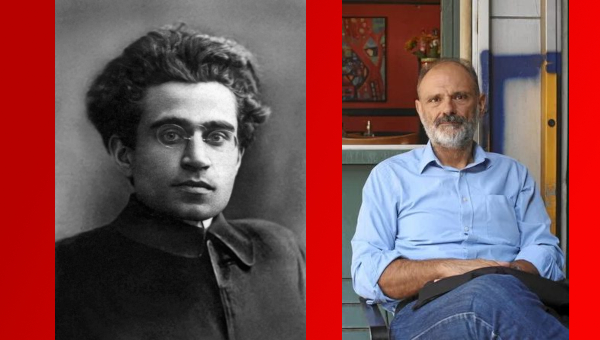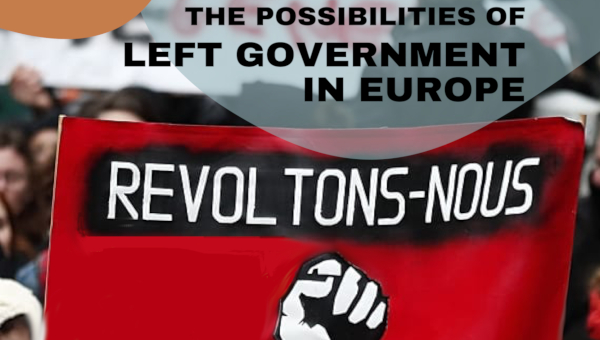Reimagining Socialist Parties and Practice
Presentation at the Left Forum-Socialist Register memorial forum, “Beyond the Socialist Impasse: Remembering Leo Panitch,” June 5, 2021.
I am sure that no one, especially those of us who knew Leo Panitch personally, could imagine, let alone organize, a discussion on socialist parties without him. This is because his shocking and unexpected passing left a huge gap in the left intellectual community; more so because his work and his contributions constitute a crucial task for every leftist today: to reimagine the organizational principles and practices of the socialist party. Indeed, it would not be an exaggeration to say that Leo’s entire work could be described as a series, as pieces of the theoretical and practical requirements needed to help the left, the people who were and are committed to a socialist transformation, to remain and become more radical, to be more realistic, effective, and optimistic – simultaneously.
The rigor of Leo’s research and the sophistication of his arguments, in combination with his normative choices and commitment made him one of the most influential militant intellectuals in the field. He offered us great insights into how to overcome the stalemate of the socialist strategy, both theoretically and practically. It is this preoccupation that, in my opinion, allows us to read his work as a serious and systematic effort to overcome, or better yet, to minimize, the ever-present antithesis between theory and practice. Politics to him was not limited simply to an analysis of the status and the dynamics of state power and its relation to the institutions of social and political representation. It was also an attempt to test and understand its transformative capacity. This inclination led him to devote much of his work to the political party, as the prime political agent for socialist endeavor.
The many insights of his work and the recent experience of SYRIZA, which unfortunately seems to be in the process of changing from a hopeful party of “New radicalism” to a disappointing party of “new realism,” will guide the brief remarks, which follow. These do not fully present the complexities of the issues involved in the necessary redrafting of the socialist organization and strategy. In fact, they should be treated as some of the introductory points of a much wider and more detailed discussion. This is a discussion in which not just theorists on the issues involved but also experienced political organizers from all active parts of the left experience will have to participate.

Clarify the Framework
As is often the case, since the assumptions and the axiomatic points are not clear, debates on the left tend to be either cyclical, disorganized, or in the end, inconclusive. Thus, we must clarify the given framework of our assumptions. These should be considered key in starting to break the widespread impasse of socialist organization and strategy.
First, to reimagine the socialist party of our times, we should capitalize on the experience of the entire left. Thus, for example, we must not ignore the ability of the reformist, the social-democratic left, to govern. However, we must make it clear that in today’s capitalist dynamics, there is no room even for the reforms of the old time classic social democracy. And, even more so, we must reject the ideas of those social democrats who, in one way or the other, have subscribed to the “modernizing” and neoliberal logic in which they see the side-effects of capitalism as the cause of our problems. Consider, for example, the overemphasis they give to the expansion of inequalities, to environmental protection, etc.
Second, given the historical impasse and the tragic distortions of almost all traditions of the left movement – both old and new – it is important to understand that the outcome of our discussion should address the hopes and the considerations of the entire left. The unity of the left is not a rhetorical, opportunist call, but rather, a productive and necessary task. In addition to everything else, we need to build upon and capitalize on the advances of all the efforts of the left, not only those of the last two decades but also those of the 20th century. Of course, this has to be done without hiding the mistakes, the inadequacies, and the naiveté of all types of social democracy, the “poly-Leninist” traditions, and the new social movements, which often have led to a marginalization of the left.
Third, the strategic challenges and dilemmas of the new party should not be limited to the old, and to some extent dated or meaningless, “reform or revolution.” As Leo reminded us on many occasions, revolutionaries should enrich the problematic of their strategy by working to alleviate the pain and the everyday hardships of the people and the subordinate classes that are caused by capitalist aggression. This logic also puts an end to another meaningless puzzle that socialists have imposed upon themselves. This has to do with the question of whether radical socialists should become organized to assume governmental responsibilities. If the party does not get organizationally, programmatically, and ideologically prepared for such a contingency, then the left project, the socialist prospect, and leftists turn into hobbyists, a lifestyle community, and our collective efforts become a kind of “hermitism.”
Fourth, in continuation of the previous point, in the current conjuncture, it is important for socialist parties to be efficient and politically effective, now more than ever before. After its dramatic failure to intervene in a counter-hegemonic fashion during the last major crisis in 1970s, the left cannot afford to display the same “laziness.” This is especially true now that the COVID situation has forced us into paying more attention to not just the antitheses of the contradiction between capital and labor but also the questions around gender, race, and the environment.
Fifth, although we are talking about a “socialist party,” given the widespread crisis of political parties, it is not unusual for many on the left to doubt whether parties, and especially socialist parties, make sense today. However, as has been insightfully argued, political parties exist, function, and act at three levels: 1) the party on the ground, 2) “the party in Central office and 3) party in public office.” This gives us the opportunity to be more specific on the types of crises that parties are facing. Parties are confronting major crises at the two first levels, while at the same time, parties remain of critical importance in organizing and legitimizing the regime, as well as the democratic process of the political system. In this sense, parties cannot be thought of as institutions of the past. There are no other institutions that can replace them. Parties are unique institutions of society. Given their presence and involvement in society, they are able to have governmental aspirations, as they can translate societal protest, demands, prospects, and visions into political programs and state policies. Thus, the party is not over.
Sixth, the party, above all else, is an organization, and in fact, a political tool in the hands of the social class (es) and strata that it appeals to. Thus, it is crucial to make a systematic effort to build an internal organization in accordance with the current social division of labor and the communication capacities of our times. This means an organization that will be able to overcome the crisis of representation and become a democratizing force in and outside of state power.
Finally, it is important that the party develop a culture among its cadre and members that operates within its own time frame for its activities and initiatives, rather than that imposed by the media or by electoral cycles. Long-term planning for the radical left that struggles to transform society cannot, for example, only aim at the “next electoral” race. Mistakes like this lead unavoidably to a narrow vision and to disappointments and widespread pessimism.
Lessons From Recent Experience
Keeping all of the above in mind, in rethinking the socialist party, it is particularly useful to draw lessons from the experience of the radical left parties that dared to cross the threshold of power, in Latin America, in the European South, and particularly, SYRIZA. We need to analyze the omissions, the errors, and the retreats in a sober, serious, and non-dogmatic fashion, not based upon implications and “analyses” that everything is intentional and should be attributed to the treasonous inclination of certain individuals. Those who belong to what could be called the “platonic left,” which seems to have divorced itself from dialectics, often make such mistakes.
We need to leave aside the obvious international constraints, the geopolitical limitations, and the obligations, or the not-so-obvious lack of left opposition from the outside and the ineffective opposition from within. Taking a serious look to the Southern European experience, and especially that of SYRIZA, can provide us with useful pointers in rethinking socialist organization. What follows here is by no means an exhaustive or analytical list; rather, it highlights the most striking ones.
– Given that quite often political strategy is the outcome of circumstantial and/or conjunctural sociopolitical dynamics, the socialist party should focus on a collective and deeper understanding of this political strategy. And of course, a constant updating is necessary. Omissions in this department carry a two-fold risk for the party that can lead to losing its political compass and vitality: either by systematic misinterpretations of its opponents and the inertia of daily political pressures or due to non-adaptation to changing conditions.
– Part and parcel of socialist party building is a theoretical, strategic, and practical guide on how to enter and democratize the state. SYRIZA was not alone in paying dearly for its naïve understanding of the power of the capitalist state. Many socialists who found themselves in power made similar mistakes. An understanding that fluctuated between an instrumentalist conception of political power to an instrumentalist submission to its almighty reproductive capacities led to a disastrous experience.
– A party of the radical socialist left should challenge the economistic rhetoric imposed either by the international institutions of fiscal supervision or simply by the neoliberal hegemonic discourse. If the party of socialist aspirations fails to do so, this will lead to the undermining of its radical policy potential, since the latter will automatically fall into the constraints of the dominant fiscal discipline.

– The occasional advances of socialist parties should be analyzed and constantly adapted to the ever-changing conditions. In SYRIZA’s case for example, there was a striking failure to update its strategic appeal, the political cleavage that brought the party to political prominence. The cleavages, the polarization of “Memorandum vs anti-Memorandum,” and austerity vs anti austerity were never really renewed, or in fact, upgraded to an anti-neoliberal or even timidly anti-capitalist discourse.
– The understanding that we need a new collective organization, a new socialist party, should not stop at the level of a party constitution. Given that we are in search of a new mass socialist party of our times, where participation and accountability will be its trademark, we must be ready to experiment with new organizational practices. These practices should accommodate the fact that the class struggle never stops at the door of the socialist party, and therefore, provisions must be made for the democratic and accountable procedures to accommodate it. In addition, these practices will protect the left party from developing the devastating trends of cartel parties. We need a party organization to defend ourselves, both from parliamentarism as well as from statism.
– Needless to say, innovative political education is key in such an effort. It is also key in creatively confronting the party deficits and crises, both in its functions “on the ground” and “in the Central office.”
– Although we have known since the time of Machiavelli that politics go hand in hand with communication and “communicative techniques,” you should not and cannot reduce one to the other. The party organization should always be the critical supporter of the party in government, not only as a mobilizer of social support for very important “impossible reforms” put forward by the government, and should also function as its active social and political critic.
– Finally, there is no doubt that our vision should always be international and global. In the case of the European radical left parties, for example, one should still criticize and make constant efforts to fully and decisively surpass the Europeanist fetishism as a hegemonic narrative. And even better, we should work to develop alternative international institutions.
Many of the above points were part of Leo’s contribution to a conference with the theme “The Left in Government: What, Why and How” (20-22 March 2014) held in Athens and organized by the Rosa Luxemburg Institute just ten months before the great victory of SYRIZA in January 2015.
Unfortunately, the “first party,” in Leo’s words, “the only one to dare to enter the state in the 21st century and challenge the neoliberal dominance” did not listen. Hope was short circuited.
Given his deep mastery of the craft, of his episteme, in combination with his passionate involvement in the left, Leo knew that our road to social justice would be hard and long, a marathon, not a quick “event” to impress the audience of the 6 o’clock news. This is the reason that he remained, to the end, a passionate supporter, as well as an uncompromising critic, of the adventure of the socialist project in Greece and elsewhere in the world. As the social, the political, and the environmental state of affairs of our world deteriorates, especially after the Pandemic, and the voices and concerns for social justice and socialist transformation become stronger and stronger, we will have to turn once again to the insights of Leo’s intellectual contribution, for both encouragement and ideas. •





